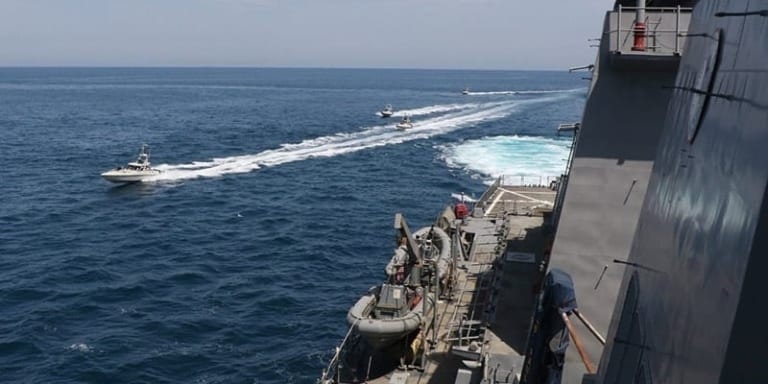
On April 15, eleven Islamic Revolutionary Guard Corps (IRGC) boats approached within ten yards of US Navy ships in international waters in the northern Arabian Gulf, once again exacerbating tensions in the region. The immediate American response was one of de-escalation and did not reflect the preponderance of naval force the United States enjoys in the Gulf. In June 2019, Washington refrained from responding to Tehran’s downing of an American drone. President Donald Trump’s order to the US Navy on April 22 to “shoot down and destroy” Iranian boats did not appear to represent a real threat but only to serve as part of the war of words between the United States and Iran. In fact, the muted American reaction cast doubt on the purported imbalance of military power in the Gulf in favor of the United States and perhaps allowed Iran to claim at least a symbolic victory that could buttress an increase in its activities in the Gulf and the wider region.
Recent Incident Is One among Many
The April 15 incident is the latest in a series of US-Iranian tensions since the early years of the Iranian Revolution of 1979 when, during the Iran-Iraq war of 1980-1988, IRGC boats harassed American vessels providing protection to Kuwaiti oil tankers. The provocations and direct attacks have not been limited to the United States but also to civilian and military assets of Gulf states and the United Kingdom. For example, in 2019 the United States accused Iran of instigating attacks on Saudi oil tankers in the Gulf of Oman. Iran also commandeered a British tanker in response to the British capture of an Iranian tanker transporting oil to the Syrian regime. These and other incidents prompted Washington to call for the establishment of a maritime security force to protect shipping in the Gulf and the Strait of Hormuz.
Iran’s harassment has not been limited to the maritime domain of the Gulf and its environs. Iraq has served as a major arena for Shia militias, supported and supplied by Iran, to strike American bases and assets.
Iran’s harassment has not been limited to the maritime domain of the Gulf and its environs. Iraq has served as a major arena for Shia militias, supported and supplied by Iran, to strike American bases and assets. Last December, these militias attacked the well-protected American embassy in Baghdad after US forces raided Hezbollah-Iraq bases on the Iraqi-Syrian border, following the killing of an American contractor. Since then, a clear state of war has existed between American forces in Iraq and these militias. Earlier this year, the militias succeeded in forcing the Iraqi parliament to pass legislation to end the American military presence in the country following the assassination of General Qassem Soleimani, the commander of the IRGC’s Quds Force. This demand is fully supported by Iran, whose spokespeople repeat it at every occasion.
Why Has the United States Not Responded Forcefully?
The American response to Iran’s activities has been ineffective. It has concentrated on tightening sanctions on the Islamic Republic and adding Iranian officials to sanctions lists. This calls into question the reasons for Washington’s refrain from punishing Iran with an action commensurate to its offensive activities and practices.
First, it appears that the coronavirus pandemic, which has overwhelmed the United States, has forced the Trump Administration to recoil from responding to external threats. To be sure, the pandemic’s domestic impact has been hard and has affected all sectors of US society and the American economy. It is interesting—and indeed tragic—that units of the US Navy have been severely affected, sidelined, and prevented from helping to project American power.
Second, over the last few years the United States has become apprehensive about the rise of influence of China in the Asia-Pacific region and thus has felt compelled to try to shift some assets and attention to that strategic area. This shift came at the expense of the Arabian Gulf, whose hydrocarbon assets are no longer as essential for the US economy as in the past. On the other hand, the United States still maintains important strategic bases in the region––such as the Al-Udeid Air Base in Qatar and the Juffair American Naval Support Center in Bahrain––that are important in defending US interests in the Gulf. These also serve to threaten China’s economic well-being, which is dependent on hydrocarbon imports from the region.
Additionally, there are some structural, military, and political considerations that can explain, at least partly, the American reluctance to respond to Iran militarily. These can be summarized as follows:
- The United States fears that an Iranian attack on one of its ships using asymmetric warfare could potentially sink an important asset in the Gulf. This would impact the military reputation and readiness of the United States. The same could be said if Iran were to use missiles to attack American land bases in Gulf Arab countries.
- The United States is concerned about the ability of Gulf Arab countries to withstand Iranian attacks. Strikes on any one of the small states in the Gulf could result in its collapse and have a domino effect on others, a development that could wreak havoc on financial markets around the world.
- The Trump Administration is not interested in a military confrontation with Iran at this time—during what is shaping up to be a very difficult election year for President Trump. An Iranian attack in the Gulf or by Iran-supported militias in Iraq would make his reelection hostage to developments far from home and during a difficult battle against the coronavirus pandemic. In fact, the Trump Administration has recently dispatched more Patriot missile batteries to Iraq to provide extra defense for American troops there.
Iraq Remains an Important Arena
The above reasons and the cautious American response to Iran’s provocations notwithstanding, the Gulf region continues to be vital for US strategic interests. To be sure, the American stance is worrisome and calls into question whether American foreign policy in the region is being led and made by officials who have an understanding of American history in the area and are working to protect the common interests of the United States and its partners.
The formation of a cabinet in an Arab country [Iraq] may rest with the political skills of an Iranian military commander.
The confusion about this policy is most obvious regarding Iraq, where Iran appears to be the dominant decision-maker. With tensions heightened, the new leader of Iran’s Quds Force, General Esmail Ghaani, paid a visit to Baghdad in early April to help unify Iraq’s political forces so that a new government could be formed in the country. In other words, the formation of a cabinet in an Arab country may rest with the political skills of an Iranian military commander. Iran-friendly political forces have caused the failure of two prime minister-designates––Mohammed Tawfiq Allawi and Adnan al-Zurfi––to form a government. Now, a third designate, Mustafa al-Kadhimi, is trying to convince Iranian officials that he is the right one for the job—in other words, that he can be relied upon to preserve Iran’s interests in Iraq. His chances lie with the same Shia political forces that ended his predecessors’ dreams to form a new cabinet for the country.
Under these circumstances, American policy in the Gulf and Iraq is expected to remain ambiguous and rudderless. President Trump will remain busy with the administration’s response to the coronavirus pandemic and keeping American forces safe from the virus. However, he is clearly busier now in his efforts to assure his reelection, now that the American economy is showing very disturbing signs, than to pay much attention to happenings in the Arabian Gulf and the wider region.

